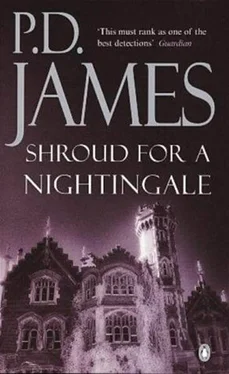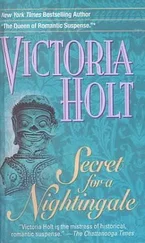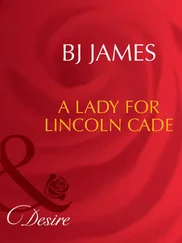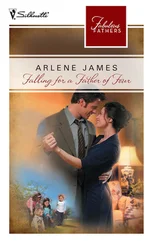P James - Shroud for a Nightingale
Здесь есть возможность читать онлайн «P James - Shroud for a Nightingale» весь текст электронной книги совершенно бесплатно (целиком полную версию без сокращений). В некоторых случаях можно слушать аудио, скачать через торрент в формате fb2 и присутствует краткое содержание. Жанр: Детектив, на английском языке. Описание произведения, (предисловие) а так же отзывы посетителей доступны на портале библиотеки ЛибКат.
- Название:Shroud for a Nightingale
- Автор:
- Жанр:
- Год:неизвестен
- ISBN:нет данных
- Рейтинг книги:3 / 5. Голосов: 1
-
Избранное:Добавить в избранное
- Отзывы:
-
Ваша оценка:
- 60
- 1
- 2
- 3
- 4
- 5
Shroud for a Nightingale: краткое содержание, описание и аннотация
Предлагаем к чтению аннотацию, описание, краткое содержание или предисловие (зависит от того, что написал сам автор книги «Shroud for a Nightingale»). Если вы не нашли необходимую информацию о книге — напишите в комментариях, мы постараемся отыскать её.
Shroud for a Nightingale — читать онлайн бесплатно полную книгу (весь текст) целиком
Ниже представлен текст книги, разбитый по страницам. Система сохранения места последней прочитанной страницы, позволяет с удобством читать онлайн бесплатно книгу «Shroud for a Nightingale», без необходимости каждый раз заново искать на чём Вы остановились. Поставьте закладку, и сможете в любой момент перейти на страницу, на которой закончили чтение.
Интервал:
Закладка:
“What with this weather and with half the training staff off sick, it looks as if you’re in for a pretty dull day.”
As the two friends were to tell each other for years to come, with that cozy predilection for re-stating the obvious which is one of the pleasures of long intimacy, she could hardly have been more wrong. Miss Beale, expecting nothing worse of the day than a tedious drive, an arduous inspection, and a possible tussle with those members of the Hospital Nurse Education Committee who took the trouble to attend, dragged her dressing-gown around her shoulders, stubbed her feet into her bedroom slippers and shuffled off into the bathroom. She had taken the first steps on her way to witness a murder.
II
Despite the rain, the drive was less difficult than Miss Beale had feared. She made good time and was in Heatheringfield just before 9 o’clock in time to meet the last surge of the morning rush to work. The wide Georgian high street was blocked with vehicles. Women were driving their commuter husbands to the station or their children to school, vans were delivering goods, buses were discharging and loading their passengers. At the three sets of traffic lights the pedestrians streamed across the road, umbrellas slanted against the soft drizzle. The young had the spruce, over-uniformed look of the private-school child; the men were-mostly bowler-hatted and carrying briefcases; the women were casually dressed with that nice compromise between town smartness and country informality, typical of their kind. Watching for the lights, the pedestrian crossings and the signpost to the hospital, Miss Beale had only a brief chance to notice the elegant eighteenth-century guildhall, the carefully preserved row of timber-fronted houses and the splendid crocketed spire of Holy Trinity church, but she gained an impression of a prosperous community which cared about preserving its architectural heritage even if the row of modern chain stores at the end of the high street suggested that the caring might well have begun thirty years earlier.
But here at last was the signpost. The road to the John Carpendar Hospital led upward from the High Street between a broad avenue of trees. To the left was a high stone wall which bounded the hospital grounds.
Miss Beale had done her homework. Her briefcase, plump on the back seat of the car, contained a comprehensive note on the hospital’s history as well as a copy of the last General Nursing Council Inspector’s report and the comments of the Hospital Management Committee on how far it had been possible to implement the inspector’s optimistic recommendations. As she knew from her researches, the hospital had a long history. It had been founded in 1791 by a wealthy merchant who had been born in the town, had left it in youthful penury to seek his fortune in London, and had returned there in his retirement to enjoy patronizing and impressing his neighbors. He could have purchased fame and ensured his salvation by succoring the widows and fatherless or by rebuilding the church. But the age of science and reason was succeeding the age of faith and it had become fashionable to endow a hospital for the sick poor. And so, with the almost obligatory meeting in a local coffee house, the John Carpendar Hospital was born. The original house, of some architectural interest, had long since been replaced, first by a solid Victorian monument to ostentatious piety and then by the more functional gracelessness of the twentieth century.
The hospital had always flourished. The local community was predominantly middle-class and prosperous, with a well-developed charitable sense and too few objects on which to indulge it. Just before the Second World War a well-equipped private patients’ wing had been added. Both before and after the advent of the National Health Service it had attracted wealthy patients, and consequently eminent consultants, from London and further afield. Miss Beale reflected that it was all very well for Angela to talk about the prestige of a London teaching hospital, but the John Carpendar had its own reputation. A woman might well think there were worse jobs than being Matron of a developing district general hospital, well thought of by the community it served, agreeably placed and fortified by its own local traditions.
She was at the main gates now. There was a porter’s lodge on the left, an ornate doll’s house in tessellated brick, a relic of the Victorian hospital, and-on the right-the doctor’s car park. Already a third of the marked plots were occupied by the Daimlers and the Rolls. It had stopped raining and the dawn had given way to the gray normality of a January day. The lights were full on in the hospital. It lay before her like a great ship at anchor, brightly lit, latent with activity and power. To the left stretched the low glass-fronted buildings of the new out-patient department Already a thin stream of patients was making its dispirited way to the entrance.
Miss Beale drew up alongside the inquiry hatch of the lodge, wound down the car window, and announced herself. The porter, ponderous and uniformed in self-importance, deigned to come out to present himself.
“You’ll be the General Nursing Council, Miss,” he stated grandiloquently. “What a pity you decided to come in this gate. The Nurse Training School is in Nightingale House, only 100 yards or so from the Winchester Road entrance. We always use the back entrance for Nightingale House.”
He spoke with reproachful resignation, as if deploring a singular lack of judgment which would cost him dear in extra work. “But presumably I can get to the school this way?” Miss Beale had no stomach for a return to the confusion of the High Street or intention of circling the hospital grounds in search of an elusive back entrance.
“Well you can, Miss.” The porter’s tone implied that only the willfully obstinate would try, and he settled himself against the car door as if to deliver confidential and complicated directions. They proved, however, remarkably simple. Nightingale House was in the hospital grounds at the rear of the new out-patient department.
“Just take this road to the left, Miss, and keep straight on past the mortuary till you get to the resident medical quarters. Then turn to the right. There’s a signpost where the road forks. You can’t miss it.”
For once this notoriously unpropitious assertion seemed justified. The grounds of the hospital were extensive and well wooded, a mixture of formal garden, grass, and clumped unkempt trees which reminded Miss Beale of the grounds of an old mental hospital. It was rare to find a general hospital so well endowed with space. But the several roads were well signposted and only one led to the left of the new out-patient department The mortuary was easily identified, a squat ugly little building tactfully sited among the trees and made more sinister by its strategic isolation. The medical officers’ residence was new and unmistakable. Miss Beale had time to indulge her usual, frequently quite unjustified, resentment that Hospital Management Committees were always more ready to rehouse their doctors than to provide adequate accommodation for the nurse training school, before noting the promised sign. A white painted board pointed to the right and read “Nightingale House, Nurse Training School”.
She changed gear and turned carefully. The new road was narrow and winding, banked high on each side with sodden leaves so that there was barely room for the single car. Everywhere was dampness and desolation. The trees grew close to the path and knitted themselves above it ribbing the dark tunnel with their strong black boughs. From time to time a gust of wind brought down a spatter of raindrops on the car roof or flattened a falling leaf against the windscreen. The grass verge was scarred with flower beds, regular and oblong as graves and spiked with stunted bushes. It was so dark under the trees that Miss Beale switched on her side lamps. The road shone before her like an oiled ribbon. She had left the car window down and could smell, even above the inevitable car smell of petrol and warm vinyl, a sweet fungoid stench of decay. She felt strangely isolated in the dim quietness and suddenly she was touched with an irrational unease, a bizarre sensation of journeying out of time into some new dimension, borne onwards towards an uncomprehended and inescapable horror. It was only a second’s folly and she quickly shook it off, reminding herself of the cheerful bustle of the High Street less than a mile away and the nearness of life and activity. But it had been an odd and disconcerting experience. Angry at herself at this lapse into morbid folly, she wound up the car window and stepped on the accelerator. The little car leaped forward.
Читать дальшеИнтервал:
Закладка:
Похожие книги на «Shroud for a Nightingale»
Представляем Вашему вниманию похожие книги на «Shroud for a Nightingale» списком для выбора. Мы отобрали схожую по названию и смыслу литературу в надежде предоставить читателям больше вариантов отыскать новые, интересные, ещё непрочитанные произведения.
Обсуждение, отзывы о книге «Shroud for a Nightingale» и просто собственные мнения читателей. Оставьте ваши комментарии, напишите, что Вы думаете о произведении, его смысле или главных героях. Укажите что конкретно понравилось, а что нет, и почему Вы так считаете.












